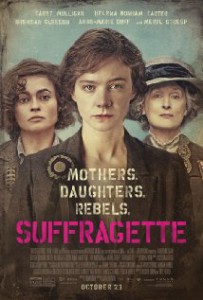Carey Mulligan, Helena Bonham-Carter and Meryl Streep sacrifice plenty as a Suffragette for women’s rights. Set in 1921 England, at the height of the women’s movement for equal rights and voting privileges, Maud Watts (Mulligan) is a 24 year old laundress, dealing with the stresses of a poor paying job, as well as a boss who belittles her with every chance. While delivering a package one day she is caught up in a suffragette riot involving smashing windows where she recognizes one of her co-workers, Violet (Anne-Marie Duff). Later, Edith (Bonham-Carter),the general of the movement, encourages the women from the laundry to speak out to parliament and give testimony in order to secure the right to vote. Though Violet is the one who offers to testify an accident means that Maud is the one who testifies. Through her relationship with Violet, Maude gradually finds herself becoming more and more involved in the suffragette movement even as it begins to have devastating effects on her family and working life. “Suffragette” throws out the rulebook on everything you already knew about the women’s movement, and provides a brutally honest and up-close look at the harsh realities that women in England faced everyday.
The movie is of course led by Oscar worthy performances that begins and ends with Mulligan. The film offers a truly marvelous transformation for her, and it’s at the cost of this character losing many important aspects of her life piece by piece. What makes Mulligan’s performance so much more convincing is the detailed and well telegraphed events that the screenplay (Written by Abi Morgan) conjures up for it’s audience. It’s very difficult for me to become emotionally invested into a film when I am seeing 200 movies a year, but “Suffragette” transported me into a soldier on the front line, fighting for this noble cause. There are many tough scenes in the movie, but one that happens during the beginning of the third act, will hit the hardest in the cold hearts of any stone face. Without Mulligan’s performance, this story doesn’t get off the ground without believability in a cold stare, as well as long winded dialogue that breaks through when she has reached her breaking point. One scene in particular with Brendan Gleeson in the interrogation room, should be shown in March when she is nominated for her third Academy Award. Bonham-Carter is also remarkable. Giving her best performance to date. It was nice to see her break out of the weird characters that she has been known for in Tim Burton films, and play an honest role that supplies a lot of the bravery for these many tortured and defeated women. Bonham-Carter’s role is among the very best for positive female protagonists that i have seen in 2015, and the movie is made even stronger because of her friendship with Mulligan. Streep is only in the film for one scene, and while it is a bit of a disappointment, she grants the inspiring words to lay the groundwork for the following hour that hits hard without slowing down to breathe.
If “Suffragette” has one incredible strength however, it’s in it’s production designs both technically in the cinematography of the film, as well as the great values that went into the costumes and set pieces. The attention to detail in the look of this film is spectacular. The film’s tone and look cast itself as a kind of bleak and almost grey situation for the ladies future forecast. The look that is devoid of any clear defining color is perfect for the styles and fashions of the early 20th century. I noticed many scenes with more than one Model T car roaming the streets, as well as hundreds of background extras sporting the fashions that defined that current age. It’s because of these things, it’s easy to get lost in this film and find yourself at the mercy of the film for the 100 minute run time. The only thing negative that I can say for this aspect of the film, was the poor choice of camera style and framing. The movie goes for the shaky handheld camera effect, and it just doesn’t work for the feel of this film. Far too many times, I was trying to register any kind of emotion from Mulligan after a terrible event happens to her, but the camera work is offering a close up of her cheek, with the other half of her face out of focus. It’s nothing that takes away too much from the film, but i wish they would’ve decided on a basic steady cam for the film’s artistic direction.
If you check out “Suffragette”, be sure to stay for the credits after the feature. These credits offer a refresher course for other countries outside of England, and shows how long it took for them to receive the same rights that the women fought for in this film. Besides this, there’s some real nice black and white footage of the real life Suffragette movement, that picks up right where the film left off, with it’s somber finale. If these credits reflect just one thing, it’s that these women deserve the kinds of acknowledgement for the things they fought for and lost in the process. Some serious sacrifices had to be paid, and I’m glad that director Sarah Gavron telegraphs a piece in time perfectly, when men and women were anything but equal. “Suffragette” is a film that not only every woman should see, but every man as well. It’s a clear reminder of how far we’ve come, while offering reminders of how far we have to come with current rights movements still taking place in 2015.
9/10
